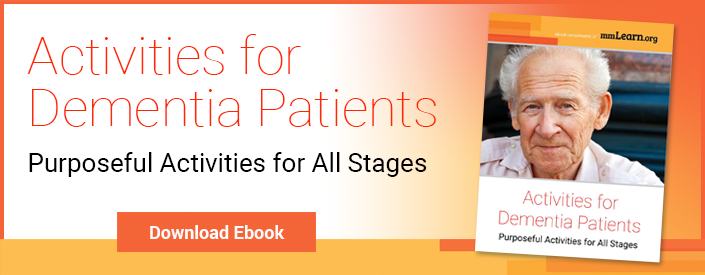 If you’re old enough to drive, you’ve probably misplaced your car keys. It doesn’t mean you have dementia. We’ve all done it.
If you’re old enough to drive, you’ve probably misplaced your car keys. It doesn’t mean you have dementia. We’ve all done it.
Occasional lapses, as long as they don’t interfere with daily functioning, are certainly part of growing older.
But let’s say someone forgets to turn off the stove after cooking something, or can’t find the car.
Is It Dementia?
Dementia is a growing problem in the world population, and more than 6 million people in the United States have Alzheimer’s disease, according to the Centers for Disease Control. It is important to recognize early warning signs, create an opening for discussing dementia with our loved ones, and connect with professionals who can help diagnose and treat dementia.
Senior Moments vs. Dementia
In this mmlearn video, Erin Bonitto, MS, ADC, and founder of Gemini Consulting, shares advice for recognizing the difference between age‑associated memory impairment (so‑called senior moments) and dementia.
“Senior moments happen to all of us,” says Bonitto. “They don’t really affect our day‑to‑day lives. We can write ourselves little notes. We can have checklists, reminders.”
Dementia is more serious. It is a cluster of symptoms related to intellectual functioning, and if people are experiencing this cluster of symptoms, doctors need to get involved to find out what is causing them.
It’s also important to pay attention to memory issues because at least one long‑term study showed that people who reported more subjective memory complaints (SMCs) were more likely to experience dementia 20 years later.
Types of Dementia
There are 4 common forms of clinical dementia: Alzheimer’s disease, vascular dementia, Lewy Body dementia, and frontotemporal dementia.
This video explains some of the more significant differences, offering some ways to distinguish between the different types of dementia.
What are the signs to watch for that might indicate dementia rather than age‑associated lapses of memory?
10 Warning Signs
The Alzheimer’s Association website includes the following 10 warning signs:
-
Memory loss that disrupts daily life. Bonitto says a simple test of whether the memory loss is severe enough to be worrisome is to ask, “Is it joggable?” If the person comes up with a forgotten name or answer to a question after prompting, it might just be a “senior moment” and not a sign of dementia.
-
Challenges in planning or solving problems. This could mean someone has trouble following recipes or paying monthly bills, or they can’t concentrate on tasks that they used to be able to do.
-
Difficulty performing familiar tasks. People with dementia often don’t lose the ability to do a particular task, but rather the ability to string together a group of related tasks. A person with Alzheimer’s disease can even forget things like how to eat their favorite breakfast. They might forget how to drive to a familiar place, or forget the rules to a game they have played for decades.
-
Disorientation to time and place. People with dementia will sometimes not remember where they are, how they got there, or even what stage of their life they are in.
-
Problems understanding visual or spatial relationships. People with dementia may have trouble with balance or reading, or judging distance, or recognizing color or contrast.
-
New problems with language. People with dementia lose words, and especially nouns. They will struggle to name an object or will substitute a different word. They may stop in the middle of a conversation or repeat themselves.
-
Misplacing things and losing the ability to retrace steps. The unusual misplacement of items is what we should worry about. We all put our keys in weird places, but would someone wrap up their keys and put them in the sugar bowl or the fridge? If the person cannot retrace their steps to find things, they might need to get checked out.
-
Poor or decreased judgment. Someone is showing signs that they aren’t keeping up with grooming or they seem to be making poor financial decisions.
-
Withdrawal from work or social activities. If a person is having trouble holding or following conversations, they might not enjoy socializing as much as they used to.
-
Changes in mood or behavior. Dementia can affect people’s moods and personalities, making them more confused, suspicious, or sad. They might get irritable when a routine changes.
These 10 warning signs are not a diagnostic tool. They just mean that the person who is displaying these warning signs should visit a physician to help determine if they are showing signs of Alzheimer’s or another form of dementia.
Visit the Doctor, Together
For older individuals, memory loss can be scary. Many people fear losing independence or having to move out of their home if they can no longer care for themselves.
Some people are worried they will alienate their relatives if they bring up concerns about memory loss or dementia. The Alzheimer’s Association provides a helpful guide with 10 steps to approach memory concerns in others.
When having a conversation with a loved one, it can help to use language that doesn’t make them feel defensive. You could say something like, “I’ve noticed you couldn’t find the restaurant we always go to tonight, and I’m concerned. Have you noticed it? Are you worried?”
You can offer to visit the doctor with them, to offer support and another perspective.
And if your loved one is diagnosed with a form of dementia, there are plenty of dementia activities that can help families and caregivers stay connected and engaged while adjusting to a new phase of life.

